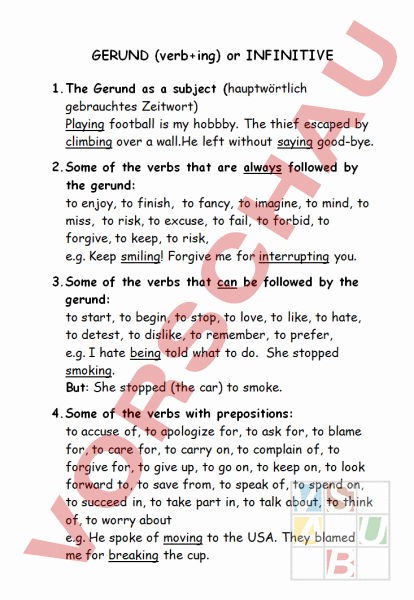Arbeitsblatt: Gerund and infinitive
Material-Details
Einführung in die Verwendung der -ing form und des infinitive im Englischen
Englisch
Grammatik
8. Schuljahr
2 Seiten
Statistik
26588
858
6
07.10.2008
Autor/in
karin wernig
Land: Österreich
Registriert vor 2006
Textauszüge aus dem Inhalt:
GERUND (verbing) or INFINITIVE 1.The Gerund as subject (hauptwörtlich gebrauchtes Zeitwort) Playing football is my hobbby. The thief escaped by climbing over wall.He left without saying good-bye. 2.Some of the verbs that are always followed by the gerund: to enjoy, to finish, to fancy, to imagine, to mind, to miss, to risk, to excuse, to fail, to forbid, to forgive, to keep, to risk, e.g. Keep smiling! Forgive me for interrupting you. 3.Some of the verbs that can be followed by the gerund: to start, to begin, to stop, to love, to like, to hate, to detest, to dislike, to remember, to prefer, e.g. hate being told what to do. She stopped smoking. But: She stopped (the car) to smoke. 4.Some of the verbs with prepositions: to accuse of, to apologize for, to ask for, to blame for, to care for, to carry on, to complain of, to forgive for, to give up, to go on, to keep on, to look forward to, to save from, to speak of, to spend on, to succeed in, to take part in, to talk about, to think of, to worry about e.g. He spoke of moving to the USA. They blamed me for breaking the cup. 5.Some of the adjectives with prepositions: afraid of, good bad at, crazy about, famous for, fed up with, fond of, interested in, sorry for, tired from,used for, be used to (gewöhnt sein an) e.g. Im used to working late. He is good at climbing. 6.Gerund after certain expressions: Cant help, cant stand, its worth, its no use, how (what) about? ,thank you for. e.g. Is this film worth seeing? cant stand listening to classical music. I.Some verbs are followed by an infinitive withto: to expect, to wish, to want, (to want someone to do sth.) to refuse, to agree, to decide, to happen, to learn, to promise, to manage, to seem, to hope, e.g. hope to see you again. She decided to leave. But: used to (früher) e.g. used to eat an ice-cream day Früher habe ich ein Eis pro Tag gegessen. II.Some verbs take an object with the infinitive: to teach, to ask, to order, to command, to get, to allow, to expect, to invite, to tell, to show e.g. They expect us to do all the work. He taught us how to juggle. III. Following verbs take an infinitive without to: modal verbs (can, may, must, will, shall, should, would, could, might) to make someone do something (veranlassen), to let, to have ( veranlassen) e.g. He had his hair cut ( Er ließ sich die Haare schneiden) She made me do all the work.
